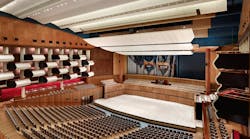When the Jackson County (Mich.) Road Commission set out to replace its problematic main boiler, it did not imagine the solution would encompass a variety of upgrades to its facilities and building controls, as well as improved working conditions — all without the addition of even an extra dime to its operating budget.
Soon after learning of Honeywell Building Solutions' MiniRetrofit Service, a facility-optimization program allowing building managers to tackle energy-saving projects without an up-front capital investment, the commission realized a MiniRetrofit contract could amortize the cost of a new boiler.
“Our furnace was 30 years old, and it would cut out frequently, which was especially problematic in the middle of winter, when we were left with a cold, uncomfortable building,” Laure Fiero, former director of administration for the Jackson County Road Commission, said. “Instead of making repeat service calls, we needed a new boiler. We talked to Honeywell, and they recommended making building upgrades to pay for the replacement.”
SOMETHING FOR NOTHING
Through an engineering site analysis of the commission's facilities, including its main administration building, sign shop, and maintenance and truck garages, Honeywell identified improvements that would generate enough energy and maintenance savings over a 10-year period to finance a boiler and related upgrades.
In addition to savings from a new, more efficient boiler, funding sources included lighting improvements, new temperature controls, and building-envelope work, including weather stripping exterior doors and roof sealing. Combined, the enhancements are expected to save around $38,000 a year.
According to Fiero, lighting improvements were the most cost-effective and visible upgrade. Before the project, facility lighting was slow in turning on and off, and rooms were dark.
“Previously, garage lighting was so dim that drivers might have been better off working on their trucks outside,” Fiero said. “Now, it's much easier for them to see when they're working on things like changing plow blades and checking fluid levels.”
Honeywell replaced the garages' metal-halide fixtures with fluorescent lamps, high-output electronic ballasts, and clear lenses. Honeywell also installed high-efficiency ballasts in offices, lounges, and conference rooms.
“The difference in the administrative offices is striking …,” Fiero said. “A lot of us are on our computers all day long, and the lighting improvements have really helped.”
KEEPING A GOOD THING GOING
To ensure the reliability of its equipment, the commission is continuing a long-standing service agreement with Honeywell. The agreement includes preventive maintenance, emergency services, equipment-component replacement, and coverage under Honeywell ServiceNet, a service-support system from the Honeywell Global Service Response Center, a centralized, around-the-clock dispatching center for service calls.
“Honeywell monitors our boiler and air-conditioning systems at all hours of the day, and if a piece of equipment isn't functioning properly, someone at Honeywell is automatically notified — even if it's over the weekend, and no one is here,” Fiero said.
Through Honeywell ServiceNet, the commission benefits from fewer equipment breakdowns and costly emergency repairs.
Since the project's completion in December 2006, not only has the commission been saving money, staff members have been paying closer attention to overall efficiency measures, such as making sure exterior doors are closed.
Information and photograph courtesy of Honeywell Building Solutions.
Circle 147








